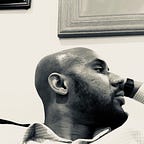White Supremacy Still Kills
Day 23
A few days ago, I wrote a letter on Medium to Richard Collins — the 23-year-old who should have been a recent college graduate but who was instead murdered by a white supremacist on the University of Maryland’s campus. This horrendous act of violence reminded me of this other racist fucking idiot who drove to New York specifically to kill black men. He killed one black man before he turned himself in.
In the past, I’ve written about and discussed at length the detrimental effects of the more subtle yet harmful aspects of racism and white supremacy — implicit bias, microaggressions, the million ways white privilege manifests itself in institutions, etc. The concepts, at times, can feel intangible. It’s for that reason I, and so many others on this site, devote time to writing and thinking about the way things like white supremacy and racism intersect and devour us (all of us) and lead us into a slow and painful psychological and cultural death.
But sometimes, when you’re trying to dissect the complexities and nuances of race, racism and white supremacy, you can get smacked in the face by what it actually means. In America it has always meant destroying black life. It’s looking at a black life and saying it should be destroyed because it’s black. Anyone can destroy it — a white supremacist or another black life. And we all know you can be Latino. It’s in our (all of our) DNA and therefore structural.
There is a structural hierarchy of life in this country. While this hierarchy isn’t solely determined by race, guess where being black will put you on that totem pole? Near the bottom — always near the bottom. We don’t treat bottom things like we treat top things. Of course, that might just be human nature.
Tell ’em, Michael.
But if it’s human nature to treat undervalued things worse, than let’s get rid of the hierarchy. Does this mean we push to a colorblind society? No. We can do away with valuing people differently and simultaneously acknowledge and celebrate their differences. The problem is human beings categorize and then start to prioritize. Is there a way do the former without the latter? I hope so. Our lives depend on it.
